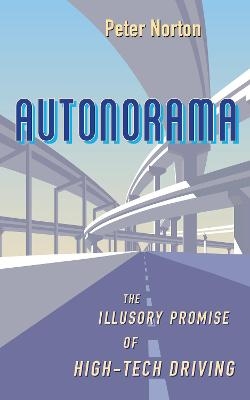
Autonorama
The Illusory Promise of High-Tech Driving
Seiten
2021
Island Press (Verlag)
978-1-64283-240-2 (ISBN)
Island Press (Verlag)
978-1-64283-240-2 (ISBN)
Norton argues that the promise of autonomous vehicles is distracting us from investing in better, more sustainable
transportation options, and increasing our dependence on cars.
“The foundation has been laid for fully autonomous,” Elon Musk announced in 2016, when he assured the world that
Tesla would have a driverless fleet on the road in 2017. “It’s twice as safe as a human, maybe better.” Promises of
techno-futuristic driving utopias have been ubiquitous wherever tech companies and carmakers meet.
In Autonorama: The Illusory Promise of High-Tech Driving, technology historian Peter Norton argues that driverless cars
cannot be the safe, sustainable, and inclusive “mobility solutions” that tech companies and automakers are promising us.
The salesmanship behind the driverless future is distracting us from investing in better ways to get around that we can
implement now. Unlike autonomous vehicles, these alternatives are inexpensive, safe, sustainable, and inclusive.
Norton takes the reader on an engaging ride —from the GM Futurama exhibit to “smart” highways and vehicles—to
show how we are once again being sold car dependency in the guise of mobility. He argues that we cannot see what tech
companies are selling us except in the light of history. With driverless cars, we’re promised that new technology will
solve the problems that car dependency gave us—zero crashes! zero emissions! zero congestion! But these are the same
promises that have kept us on a treadmill of car dependency for 80 years.
Autonorama is hopeful, advocating for wise, proven, humane mobility that we can invest in now, without waiting for
technology that is forever just out of reach. Before intelligent systems, data, and technology can serve us, Norton suggests,
we need wisdom. Rachel Carson warned us that when we seek technological solutions instead of ecological balance, we
can make our problems worse. With this wisdom, Norton contends, we can meet our mobility needs with what we have
right now.
transportation options, and increasing our dependence on cars.
“The foundation has been laid for fully autonomous,” Elon Musk announced in 2016, when he assured the world that
Tesla would have a driverless fleet on the road in 2017. “It’s twice as safe as a human, maybe better.” Promises of
techno-futuristic driving utopias have been ubiquitous wherever tech companies and carmakers meet.
In Autonorama: The Illusory Promise of High-Tech Driving, technology historian Peter Norton argues that driverless cars
cannot be the safe, sustainable, and inclusive “mobility solutions” that tech companies and automakers are promising us.
The salesmanship behind the driverless future is distracting us from investing in better ways to get around that we can
implement now. Unlike autonomous vehicles, these alternatives are inexpensive, safe, sustainable, and inclusive.
Norton takes the reader on an engaging ride —from the GM Futurama exhibit to “smart” highways and vehicles—to
show how we are once again being sold car dependency in the guise of mobility. He argues that we cannot see what tech
companies are selling us except in the light of history. With driverless cars, we’re promised that new technology will
solve the problems that car dependency gave us—zero crashes! zero emissions! zero congestion! But these are the same
promises that have kept us on a treadmill of car dependency for 80 years.
Autonorama is hopeful, advocating for wise, proven, humane mobility that we can invest in now, without waiting for
technology that is forever just out of reach. Before intelligent systems, data, and technology can serve us, Norton suggests,
we need wisdom. Rachel Carson warned us that when we seek technological solutions instead of ecological balance, we
can make our problems worse. With this wisdom, Norton contends, we can meet our mobility needs with what we have
right now.
Peter Norton is an associate professor of history in the Department of Engineering and Society at the University of Virginia. He has authored many articles, book chapters, and the book Fighting Traffic: The Dawn of the Motor Age in the American City.
Introduction: Not If but When
Chapter 1: Futurama 1: New Horizons
Chapter 2: Futurama 2: Magic Highway, USA
Chapter 3: Futurama 3: From CenterCore to Demo ’97
Chapter 4: Futurama 4: Autonorama
Chapter 5: Data Don’t Drive
Conclusion: We Already Have What We Need
Acknowledgments
About the Author
Endnotes
Index
| Erscheinungsdatum | 22.10.2021 |
|---|---|
| Verlagsort | Washington |
| Sprache | englisch |
| Maße | 127 x 203 mm |
| Themenwelt | Naturwissenschaften ► Geowissenschaften ► Geografie / Kartografie |
| Technik ► Fahrzeugbau / Schiffbau | |
| ISBN-10 | 1-64283-240-5 / 1642832405 |
| ISBN-13 | 978-1-64283-240-2 / 9781642832402 |
| Zustand | Neuware |
| Haben Sie eine Frage zum Produkt? |
Mehr entdecken
aus dem Bereich
aus dem Bereich
über eine faszinierende Welt zwischen Wasser und Land und warum sie …
Buch | Hardcover (2023)
dtv (Verlag)
24,00 €
Buch | Hardcover (2024)
Schweizerbart'sche, E. (Verlag)
24,00 €
Eine Einführung in die spezielle Mineralogie, Petrologie und …
Buch | Hardcover (2022)
Springer Spektrum (Verlag)
59,99 €


